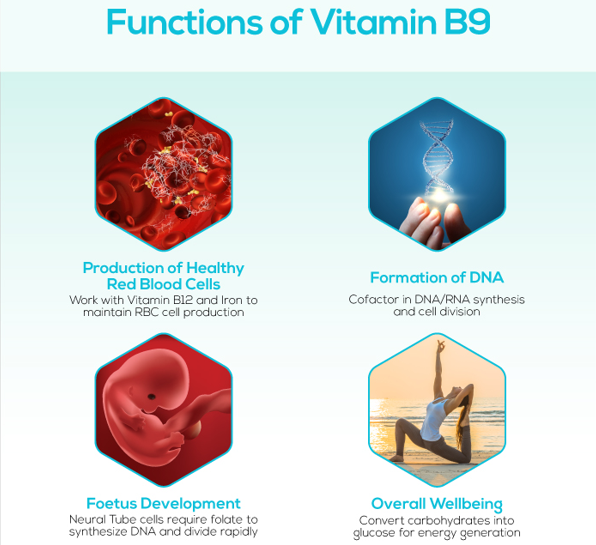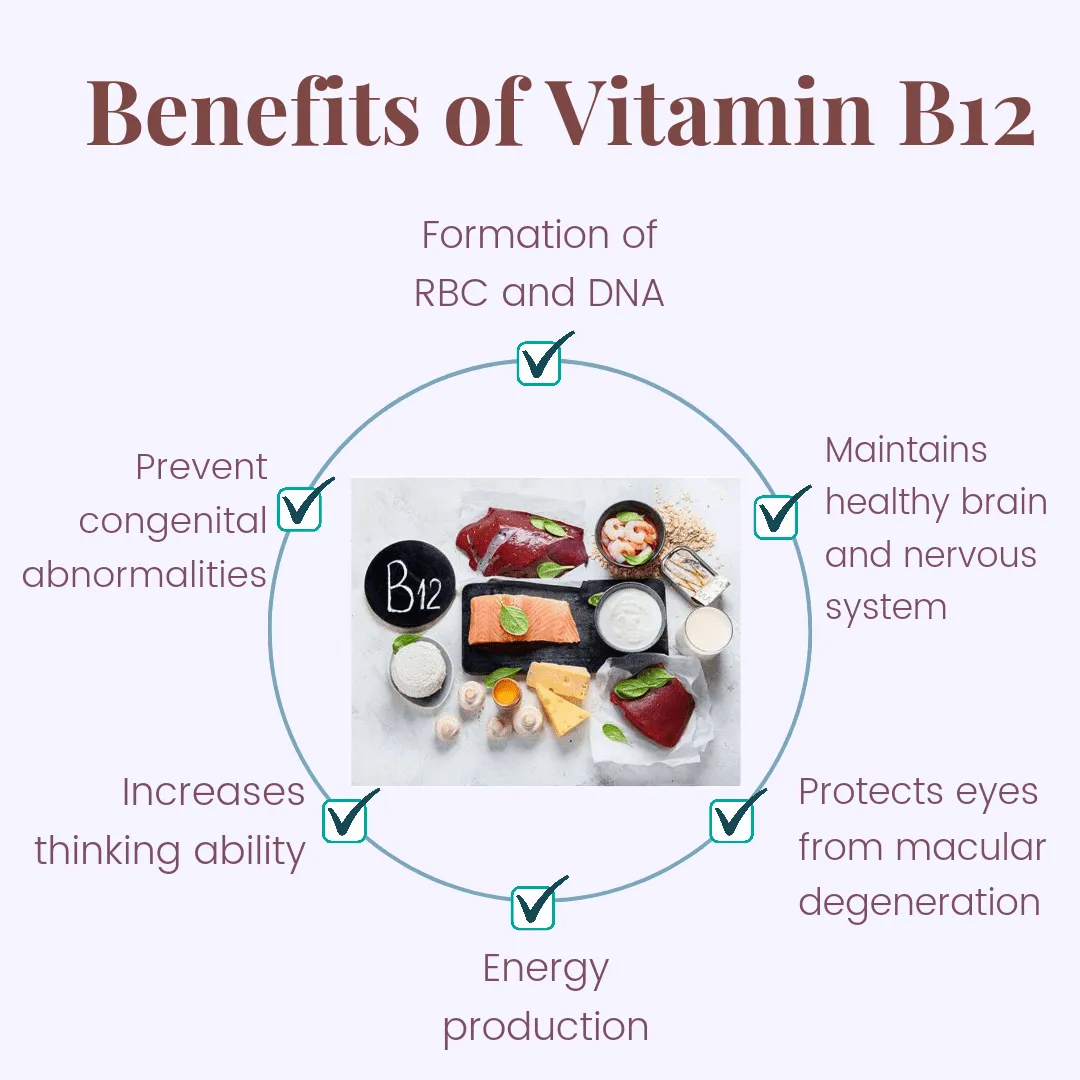The Importance of Folate and Vitamin B12 Deficiency
Folate (vitamin B9) is essential for DNA synthesis and formation of blood cells.

Food Sources:
- Mainly dark green leafy vegetables, legumes, some fruits and liver
Absorption could be inhibited by:
- Anti-seizure medicine (phenytoin)
- Alcohol
- Oral contraceptive pills
At risk individuals include:
- Elderly due to reduced intake or possible malabsorption syndromes
- People with increased requirements, such as infants, pregnant and lactating women
- Celiac disease and inflammatory bowel disease patients due to intestinal malabsorption
- Cancer patients due to increased requirements and possibly chemotherapy (e.g., methotrexate)
- People with haemolytic anaemia (including those with inherited conditions such as thalassaemia and G6PD deficiency, certain infections such as malaria and certain autoimmune disorders, such as SLE)
Associated with Symptoms of Anaemia, such as:
- Pallor
- Tiredness
- Dizziness
- Dyspnoea
- Headaches
- Sometimes chest pains
- Exercise intolerance
- Possibly prone to bleeding and/or infection
Associated with abnormal FBC results, such as:
- Macrocytic anaemia indicated by low haemoglobin (Hb) and high mean cell volume (MCV)
- Possibly abnormal deficiency in red blood cells, white blood cells and platelets
- Usually abnormal, hyper-segmented neutrophils in blood film examination
Other laboratory findings include:
- Low serum/red cell folate
- Possibly increased serum bilirubin and increased LDH
- Increased serum homocysteine (associated with cardiovascular risk)
Even though supplementation significantly benefits the health of folate deficient patients and women at a child bearing age, excessive intake could potentially have long-term risks, including cancer.
Vitamin B12 is essential in DNA synthesis, homocysteine metabolism and maintenance of healthy red blood cells and healthy nervous system (by supporting myelin integrity and neurotransmitter synthesis).

Food Sources:
- Mainly animal products (meat, fish, eggs and dairy)
At risk individuals include:
- Strict vegans due to dietary insufficiency
- People with gastrointestinal problems, such as Crohn’s disease
- Chronic alcohol users
- Chronic kidney disease patients
- Pregnant women due to increased demand associated with fetal development
- People with pernicious anaemia
- People with age-related gastric atrophy
- People undergoing long-term treatment for diabetes type 2 with metformin (Glucophage)
- People undergoing long-term treatment for acid-reflux with proton pump inhibitors
Associated with:
- Symptoms of anaemia
- Neurological symptoms (with or without symptoms of anaemia), such as muscle weakness associated with cognitive impairments, ataxia associated with depression, visual impairment associated with Parkinson’s disease, sensory impairment associated with Alzheimer’s disease and peripheral neuropathy associated with dementia
Laboratory findings include:
- Abnormal FBC results (same as folic acid deficiency)
- Possibly increased serum bilirubin and increased LDH (as in folate deficiency)
- Increased serum homocysteine (as in folate deficiency)
- Low serum vitamin B12
Correct diagnosis is important because folate deficiency and vitamin B12 deficiency share symptoms of anaemia and abnormal laboratory findings. Supplementation with folate will improve symptoms of anaemia but will not improve (or possibly exacerbate) the neurological symptoms of vitamin B12 deficient patients, who need supplementation with vitamin B12 or intramuscular vitamin B12 injections.
References:
- Baddam S, Jialal I, Khan K M. Folic Acid Deficiency. StarPearls 2025.16(39):1-16.
- https://medlineplus.gov/ency/article/000551.htm
- Bapat P, Kapur B, Koren G, Nickel C, Shere M. Association Between Use of Oral Contraceptives and Folate Status: A Systematic Review and Meta-Analysis. J Obstet Gynaecol Can 2015;37(5):430–438.
- Kumar R, Kumar V, Mohan A, Yadav M. Homocysteine, Vitamin B12 and Folate Level: Possible Risk Factors in the Progression of Chronic Heart and Kidney Disorders. Current Cardiology Reviews, 2023. 19(4):66-83.
- Barcellini W. Fattizzo B. Clinical Applications of Hemolytic Markers in the Differential Diagnosis and Management of Hemolytic Anemia. Disease Markers 2015. 635670:1-7.
- Erdol S, Ozgur T. Vitamin B12 deficiency associated with hyperbilirubinemia and cholestasis in infants. Pak J Med Sci 2018.34(3):714-718.
- Hussain U et al. Vitamin B12 deficiency and cognitive impairment: A comprehensive review of neurological impact. Brain Disorders 2025. 18(100220):1-14.